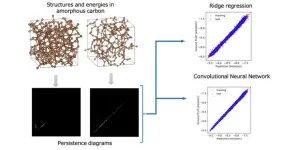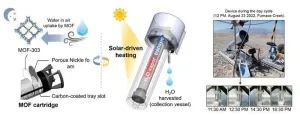(Press-News.org) Amsterdam, Netherlands – 22 Aug 2023: Heart attack patients who do not take daily aspirin have an elevated likelihood of recurrent myocardial infarction, stroke or death compared with those who consistently take the drug, according to research presented at ESC Congress 2023.1
“Our findings suggest that not taking aspirin as prescribed after a heart attack is linked to a higher risk of having another heart attack, a stroke or dying,” said study author Dr. Anna Meta Kristensen of Bispebjerg and Frederiksberg Hospital. Frederiksberg, Denmark. “We recommend that all patients who have had a heart attack stay adherent to their aspirin in accordance with guidelines until randomised controlled trials have proven otherwise, and clinical guidelines have been changed.”
Aspirin is mandatory following a heart attack due its ability to prevent blood clot formation, and thus reduce the risk of a new heart attack or stroke.2,3 However, as treatment and diagnostic methods have advanced in recent decades, the prognosis after myocardial infarction has improved and the long-term effects of aspirin are now less evident.4,5 Because aspirin prevents the formation of blood clots, it also increases the risk of bleeding, and the balance between the cardiovascular benefits and bleeding changes with time after a heart attack. This study investigated the risk associated with discontinuation of long-term aspirin compared with continued use after a heart attack in a contemporary setting.
The study used data from Danish nationwide health registries. It included patients aged 40 years and over who had a first-time heart attack from 2004 through 2017, were treated with a coronary stent and took aspirin as prescribed during the first year after their heart attack. Patients who were on anticoagulants or had a stroke or recurrent heart attack within that first year were excluded.
Adherence to aspirin was evaluated at two, four, six and eight years after the heart attack. In Denmark, every time a patient picks up a prescription of aspirin, the number of tablets and date of collection are recorded in registries. Adherence to aspirin at each of the four time points was assessed as the proportion of days patients had their pills over the preceding two years. Patients on aspirin for 80% or less of the time were considered non-adherent (i.e., not taking aspirin as prescribed) while those on aspirin more than 80% of the time were considered adherent (i.e., taking aspirin as prescribed). At each time point, patients were excluded if they had experienced another heart attack, a stroke, died, or had been started on anticoagulants or P2Y12 inhibitors.
Dr. Kristensen explained: “We assessed the effects of long-term aspirin use in patients who were not receiving other medications for the prevention of heart attack or stroke. Both anticoagulants and P2Y12 inhibitors are agents that, similar to aspirin, work to prevent the formation of blood clots. Therefore, patients undergoing such treatments were excluded from our study.”
The study included 40,114 patients with a first-time heart attack. Adherence to aspirin progressively declined with each time point, from 90% at two years following the heart attack to 84% at four years, 82% at six years and 81% at eight years.
The researchers analysed whether patients who did not take aspirin as prescribed had a higher risk of the composite outcome of recurrent heart attack, stroke or death compared with those who consistently took aspirin. A number of factors that might affect the results were taken into account including age, sex, diabetes, high blood pressure, high cholesterol, kidney disease, cancer, stomach ulcers, previous bleeding events and chronic obstructive pulmonary disease.
At each time point, patients who took aspirin as prescribed were less likely to experience the composite outcome compared with non-adherent patients. Compared with adherent patients, non-adherent patients had a 29%, 40%, 31% and 20% higher likelihood of recurrent heart attack, stroke or death at two, four, six and eight years following the heart attack, respectively.
Dr. Kristensen said: “Our results should be interpreted with caution because they show an association but do not establish causality. Since the study is registry-based, we do not have information about the specific reasons as to why patients did not take their aspirin. Furthermore, our findings cannot be generalised to all patients who experience a heart attack, as our study specifically focused on those who received treatment with a coronary stent and were not taking other medications to prevent blood clot formation. With that in mind, the results support current guidelines recommending long-term aspirin after a heart attack.”
ENDS
Notes to editors
Authors: ESC Press Office
Mobile: +336 61 40 18 84
Email: press@escardio.org
The hashtag for ESC Congress 2023 is #ESCCongress.
Follow us on Twitter @ESCardioNews
Funding: None.
Disclosures: None.
References and notes
1The abstract “Long-term aspirin adherence and risk of cardiovascular events and death after myocardial infarction: A nationwide cohort study” will be presented during the session Secondary prevention which takes place on Monday 28 August from 10:15 to 11:00 CEST at Station 10.
2Visseren FLJ, Mach F, Smulders YM, et al. 2021 ESC Guidelines on cardiovascular disease prevention in clinical practice. Eur Heart J. 2021;42:3227–3337.
3Antithrombotic Trialists' (ATT) Collaboration; Baigent C, Blackwell L, Collins R, et al. Aspirin in the primary and secondary prevention of vascular disease: collaborative meta-analysis of individual participant data from randomised trials. Lancet. 2009;373:1849–1860.
4Jacobsen AP, Raber I, McCarthy CP, et al. Lifelong aspirin for all in the secondary prevention of chronic coronary syndrome: Still sacrosanct or is reappraisal warranted? Circulation. 2020;152:1579–1590.
5Murphy E, Curneen JMG, McEvoy JW. Aspirin in the modern era of cardiovascular disease prevention. Methodist Debakey Cardiovasc J. 2021;17:36–47.
About ESC Congress 2023
It is the world’s largest gathering of cardiovascular professionals, disseminating ground-breaking science both onsite in Amsterdam and online – from 25 to 28 August. Explore the scientific programme. More information is available from the ESC Press Office at press@escardio.org.
About the European Society of Cardiology
The European Society of Cardiology brings together health care professionals from more than 150 countries, working to advance cardiovascular medicine and help people lead longer, healthier lives.
END
Heart attack patients should take aspirin to avoid a new heart attack, stroke and death
2023-08-22
ELSE PRESS RELEASES FROM THIS DATE:
Heart attack victims who recognise symptoms are less likely to die in hospital
2023-08-22
Amsterdam, Netherlands – 22 Aug 2023: Recognising and acting on heart attack symptoms is linked with faster life-saving treatment, according to research presented at ESC Congress 2023.1
“Patients with a repeat heart attack were more likely to know the symptoms than first-time sufferers, but recognition was low in both groups,” said study author Dr. Kyehwan Kim of Gyeongsang National University Hospital, Jinju, Republic of Korea. “Most patients could identify chest pain but less than one-third knew the other symptoms.”
Heart attack symptoms can include chest pain, radiating pain to the arms, jaw and neck, dizziness, ...
Keep fit to avoid heart rhythm disorder and stroke
2023-08-22
Amsterdam, Netherlands – 22 Aug 2023: A study in more than 15,000 people has found that physical fitness is linked with a lower likelihood of developing atrial fibrillation and stroke. The research is presented at ESC Congress 2023.1
Atrial fibrillation is the most common heart rhythm disorder, affecting more than 40 million people worldwide.2 It is estimated that one in three Europeans will develop atrial fibrillation in their lifetime. Patients with the condition have a five-fold higher risk of stroke ...
City-living may make male song sparrows more doting ‘super’ fathers
2023-08-22
When animals settle in new environments, or when their natural habitats are rapidly changed by human influence, their behaviors change. One such behavioral change that has been observed in several bird species that settled in cities is increased aggression, born out of the need to defend territories.
City-living sparrows have, due to lower species density, fewer encounters with their kin than in the countryside. Yet, urban song sparrows have been shown to be consistently more aggressive in defending their territories. Now, a team of researchers in the US has investigated the effects of urbanization and the associated ...
Topology's role in decoding energy of amorphous systems
2023-08-22
Osaka, Japan – How is a donut similar to a coffee cup? This question often serves as an illustrative example to explain the concept of topology. Topology is a field of mathematics that examines the properties of objects that remain consistent even when they are stretched or deformed—provided they are not torn or stitched together. For instance, both a donut and a coffee cup have a single hole. This means, theoretically, if either were pliable enough, it could be reshaped into the other. This ...
Small urban greening projects can dramatically increase number of insect species in cities
2023-08-22
By increasing the diversity of indigenous plants in urban areas, researchers from the University of Melbourne have seen a seven times increase in the number of insect species in just three years, confirming the ecological benefits of urban greening projects. The findings are published in the British Ecological Society journal, Ecological Solutions and Evidence.
The study, conducted in a small greenspace in the City of Melbourne, found that an increase in the diversity and complexity of plant communities leads to a large increase in insect biodiversity, a greater ...
Which is easier to remember, symbols or words?
2023-08-22
Everyday symbols like &?!#@$ are highly memorable, according to new research.
The new study led by the University of Waterloo aimed to investigate how well symbols are remembered compared to words with the same meaning.
“Our work is ground-breaking as it highlights how humans remember graphic symbols and logos,” said Myra Fernandes, co-author and professor of Cognitive Neuroscience at Waterloo. “Symbols are particularly useful as they can be used as logos in advertising, as well as offer a faster ...
Study finds no effect of LEED certification on federal buildings’ energy efficiency
2023-08-22
In 2010, the U.S. government announced a multi-billion-dollar plan to improve the energy efficiency of its buildings, including a focus on LEED certification. Used worldwide, LEED—Leadership in Energy and Environmental Design—is a system that rates buildings on energy efficiency. A new study examined the effects of LEED certification on energy efficiency in federal buildings. The study found no effect on average energy consumption, primarily because many other factors come into play when rating energy.
The study, by researchers ...
Water harvesting in Death Valley: Conquering the arid wilderness
2023-08-22
Korea is regarded as a “water-stressed nation.” Although the country receives an annual precipitation of approximately 1,300mm, it is characterized by concentrated periods and specific regions, thereby giving rise to challenges stemming from water scarcity. The lack of drinking water extends beyond mere inconvenience, posing life-threatening implications for certain individuals. In March 2023, the United Nations Children’s Fund (UNICEF) released a report highlighting the plight of roughly 190 million children in Africa who suffer from an absence of safe water, resulting in the tragic daily loss of 1,000 children under the age of five.
Nations across the globe ...
Driverless cars are no place to relax, new study shows
2023-08-22
Early data on activities that will be unsafe to undertake in automated vehicles has been released. From doing work to watching the world, from social media to resting – preliminary results are in.
Research led by RMIT University looked at what happens if a driver is suddenly required to take control of an automated vehicle, such as in an emergency.
The series of papers examines how experience and three types of distractions (work, social media and rest) impacted on the driver’s ability to respond.
Study lead author in the School of Engineering, Dr Neng Zhang, said ...
CORRECTION: MRI scans improve prostate cancer diagnosis in screening trial
2023-08-22
The REIMAGINE study, published today in BMJ Oncology, is the first study to use MRI scans with prostate specific antigen (PSA) density to assess the need for further standard NHS tests. Of the 29 participants found to have serious prostate cancer, 15 had a ‘low’ PSA score that would have meant they were not referred for further investigation under the current system.
Currently, men over 50 in the UK can ask for a PSA test if they are experiencing symptoms or are concerned about prostate cancer. ...



